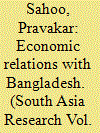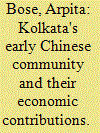|
|
|
Sort Order |
|
|
|
Items / Page
|
|
|
|
|
|
|
| Srl | Item |
| 1 |
ID:
120213


|
|
|
|
|
| Publication |
2013.
|
| Summary/Abstract |
Emergence of regional states in contemporary India as an effective arena for political and economic development has given state-level leaders a growing power. In the present coalition era, which reflects such regionalisation, this brings increasing prominence to effective state-based parties and their leaders. Focusing on recent politics of Bihar, this article shows in what ways Nitish Kumar, Chief Minister of Bihar, since 2005, unlike his predecessor Lalu Yadav, comes across as 'unusual'. Setting aside neo-patrimonial political tendencies, much in vogue among the new crop of state leaders, Nitish Kumar has instead focused on channelling both private and public resources to provide quality governance in an erstwhile 'failed state'. This, more than rootedness in a traditional community or vote bank, may largely explain continued electoral success, though a leader also depends on those around him, with all the risks for effective implementation that this entails.
|
|
|
|
|
|
|
|
|
|
|
|
|
|
|
|
| 2 |
ID:
120215


|
|
|
|
|
| Publication |
2013.
|
| Summary/Abstract |
Since 1971, India was the major trading partner of Bangladesh. However, China's trade with Bangladesh has increased manifold in recent years to surpass India from 2004 onwards. This slowing down and change of economic relations between India and Bangladesh, coupled with strained and uncertain political relations, raise multiple concerns. This article examines the various factors that have contributed to China's growing presence in Bangladesh as compared to India's decline with respect to trade and investment. India has clearly lost out to China in many important industries. While reviewing and assessing recent developments, the study also presents a strategy to counter India's declining economic influence in Bangladesh.
|
|
|
|
|
|
|
|
|
|
|
|
|
|
|
|
| 3 |
ID:
120217


|
|
|
|
|
| Publication |
2013.
|
| Summary/Abstract |
It is not widely known that Chinese people have been living and working in Kolkata for more than 300 years. Successive earlier waves of Chinese migration to the city can be traced by historical research. While such a work is still in its infancy, later developments in economic and legal fields remain almost completely uncovered, too. This brief article provides a preliminary overview of Chinese migration and business activities, occupational characteristics and various contributions of this community to the economy of the city and places Chinese migration to Kolkata in a wider context. It offers some insights into how a foreign migrant population arrives in the first place, how it may organise itself and what varied contributions it may make over time to the new place of residence. Always on the fringes, in many ways, the Chinese of Kolkata have displayed typical resilience and business acumen, but have also encountered significant difficulties worth researching in more depth.
|
|
|
|
|
|
|
|
|
|
|
|
|
|
|
|
| 4 |
ID:
120216


|
|
|
|
|
| Publication |
2013.
|
| Summary/Abstract |
This article examines how the politics of scale affect a process of dialogue led by civil society actors over fishing conflicts taking place at the local level in South Asia. The location is the Palk Bay and the fishers are Tamils from India and Sri Lanka. An agreement over fishing rights reached between these fishers in August 2010 remains largely unimplemented, but takes centre stage for this article, which examines the negotiation processes in terms of politics of scale and highlights the various difficulties encountered. Major pitfalls in a dialogue of this sort are the failure to recognise diversity within the population(s) involved and lack of recognition of the linkages of this population with other actors at different scales or levels. In a transboundary context, national and regional identities at times override local identity and interests, thereby making locally constructed solutions difficult, if not impossible, to implement.
|
|
|
|
|
|
|
|
|
|
|
|
|
|
|
|
|
|
|
|
|